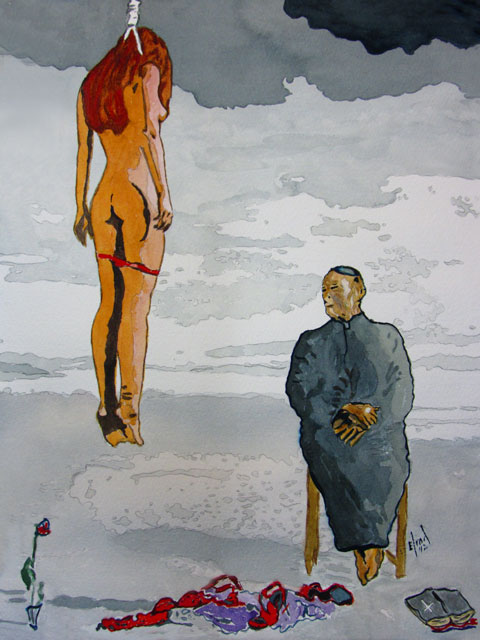My friends, I am genuinely flabbergasted.
This past week, I wrote about ethical non-monogamy—a thoughtful piece about honest sexual relationships—and watched as Christians unsubscribed. I estimate that practicing Christians compose about 5% of my subscribers. The irony is so thick you could cut it with a communion wafer. After eighteen years of writing about renouncing evangelical Christianity, abandoning a thirty-year ministry career, and creating provocative nude watercolors that would make your grandmother clutch her pearls, it wasn’t until I dared to discuss sexual honesty that some people headed for the digital exit door.
I’ve been sitting here in my Barcelona studio, staring at my latest graphite drawing and wondering: What the hell is wrong with us?
Update: As I watch the latest viral video of the CEO and his co/worker duck from the Coldplay cameras in horror, and Gina tells me about the horrific memes that have destroyed these peoples career and devastated their lives, I couldn’t help but think this would have been a non-issue if they had had consensual non-monogamy agreements.
The Selective Outrage Economy
Let me paint you a picture of my recent literary journey. I’ve written extensively about rejecting the faith that defined my first fifty years. I’ve shared intimate details about my affairs, my divorce, my complete dismantling of everything I once held sacred. I’ve posted nude artwork that celebrates the human form in all its sensual glory. I’ve criticized mega-church culture, called out pastoral authoritarianism, and essentially torched every bridge back to the evangelical world that once embraced me.
But mention that adults might ethically choose to love or have sex with more than one person simultaneously? Suddenly I’m the Antichrist.
This reaction reveals something profound about our American psyche, particularly among religious folk.
Many Americans are more comfortable with tearing down than with building up, more at ease with shame than with honesty, more willing to tolerate institutional cover-ups than individual transparency.
The Scandal of Silence
While my readers were indignant over my Tuesday post, the Catholic Church continues harboring over 1,700 credibly accused priests with little oversight. The Southern Baptist Convention maintains secret lists of 700+ accused abusers while preaching family values. Just last month, Thai Buddhist monks were exposed in an $11.9 million extortion scheme involving violations of celibacy vows.
These aren’t isolated incidents—they’re the inevitable result of sexual repression masquerading as moral authority. When institutions demand impossible standards of sexual purity while wielding unchecked power, abuse becomes systemic. Yet somehow, my honest exploration of consensual adult relationships is what triggers the moral panic.
The Evolutionary Elephant in the Room
Here’s what makes this even more maddening: the science is on the side of sexual honesty. Christopher Ryan and Cacilda Jethá’s Sex at Dawn presents compelling evidence that humans evolved in sexually communal societies. Our closest relatives used sexual contact for bonding, conflict resolution, and social cohesion. Monogamy, the authors say, emerged with agriculture and private property—a system designed to control paternity and inheritance, not to reflect our biological nature, aka the Nuclear Family.
Yet we continue perpetuating the damaging myth that lifelong monogamy is the only natural, moral choice. We shame people for evolutionary drives that are as normal as hunger or the need for connection. We create elaborate theological frameworks to justify sexual control while ignoring the mental health epidemic this creates.
The Price of Repression
Research consistently shows that sexual shame and repression lead to anxiety, depression, and relationship dysfunction. Religious sexual trauma is reaching epidemic levels, with therapists reporting increasing numbers of patients whose faith communities taught them to hate their own bodies and desires.
Meanwhile, studies of ethical non-monogamy show that when practiced with honesty and consent, it can lead to personal growth, expanded emotional connections, and even better sexual health outcomes.
The 20% of Americans who’ve tried consensual non-monogamy aren’t moral degenerates—they’re human beings seeking authentic ways to love and connect.
The Encourager’s Dilemma
Despite everything, I remain an encourager. That’s never changed, even as I’ve shed every other aspect of my former identity. But I’m increasingly convinced that the most radical act of encouragement I can offer is permission to be honest about our desires, our struggles, our explorations, and our authentic selves.
Sexual honesty isn’t about promoting promiscuity—it’s about integrating our full humanity instead of fragmenting ourselves into acceptable and unacceptable pieces. It’s about choosing our desires over control, authenticity over conformity, truth over repressive lies.
So to those who unsubscribed: I understand. Truth-telling has always been a threat to systems built on control and shame. But for the vast majority who stayed, who are willing to wrestle with complexity rather than retreat into simplicity, who choose curiosity over certainty—this is for you.
The conversation continues, with or without the unsubscribers.
Note: Ironically, the week ended with a net gain of eight subscribers despite the unsubscribes due to an influx of all-new subscriptions. Our courageous community is growing. I’m grateful for you all.

Leave a Reply